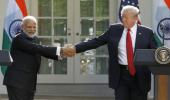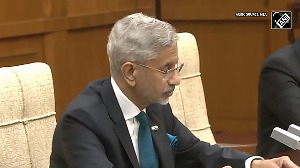General Mattis has been the most steadfast champion in Trump's cabinet of the US-India defence relationship.
If Trump chooses a more pliable successor, the Pentagon's attention could go off India.
Ajai Shukla reports.

The announcement on Friday, December 21, that General James 'Mad Dog' Mattis would soon step down as United States defence secretary un-tethers the US-India relationship from its sturdiest peg, and exposes New Delhi, worryingly, to the unpredictable policymaking of President Donald J Trump's administration.
Since January 2017, General Mattis has been the most steadfast votary in Trump's cabinet of the US-India defence relationship.
In September 2017, he became Trump's first cabinet-level official to visit India.
Since then, he has taken pro-India stands consistently on issues from Afghanistan to the Indo-Pacific.
In June, General Mattis re-designated the US Pacific Command or USPACOM -- Pentagon's largest geographical command with about 375,000 personnel and 60 per cent of the US naval fleet -- the US Indo-Pacific Command or USINDOPACOM in a nod to India's growing influence, as Washington's most valuable regional partner.
In September, General Mattis ignored Pakistan's long-standing demands to keep India out of Afghanistan and, instead, sought India's assistance and involvement in helping to stabilise that country.
When the US Congress -- furious at Russia's meddling in America's 2016 presidential election, and at Trump's reluctance to retaliate against Moscow -- passed a law titled Countering America's Adversaries Through Sanctions Act or CAATSA, it was General Mattis who strongly pushed for a waiver to save India from US sanctions, which would kick in from buying weaponry from Moscow.
With Mattis lobbying vigorously for India, the US Congress legislated a waiver from CAATSA.
General Mattis strongly supported New Delhi's argument that India's large arsenal of Russian weaponry did not allow it to make a clean break.
Eventually, the National Defense Authorization Act, 2019, which the US Congress passed in July, created a waiver for close US partners such as India.
Although Trump has not yet provided India a waiver from sanctions for buying the $5 billion S-400 air defence system from Russia, he is expected to do so.
General Mattis also supported another Section in NDAA 2019 that reinforced and fleshed out India's bespoke designation as a 'major defence partner' of the US.
While the Obama administration had accorded India that designation in its closing months, NDAA 2019 required the administration to submit a detailed annual report to the US Congress on what it was doing to enhance bilateral defence ties.
Pentagon insiders recount that, in all of this, General Mattis lobbied Congress relentlessly on India's behalf.
On July 30, India's status as a 'major defence partner' led to its categorisation as a Strategic Trade Authorization Tier 1 country in the US commerce department's export regulations.
General Mattis played a role in this upgrade as well, anticipating that it would facilitate the flow of defence equipment to India.
'This regulatory change will enhance the bilateral defence trade relationship and result in a greater volume of US exports to India,' stated the US department of commerce after announcing the STA upgrade.

Genera; Mattis also pushed through the Communications Compatibility and Security Agreement or COMCASA -- a milestone pact that was signed at the inaugural US-India 'two-plus-two' strategic dialogue in September -- in which General Mattis and US Secretary of State Mike Pompeo together met Defence Minister Nirmala Sitharaman and Foreign Minister Sushma Swaraj.
COMCASA had languished in the pipeline for over 15 years, but General Mattis persuaded New Delhi to sign the agreement.
It will allow the US and Indian militaries to operate together, communicating on secure channels and equipment.
Since the start of Trump's presidency, General Mattis has taken forward the legacy of his predecessor Dr Ashton Carter, who was similarly India's ablest votary in Washington.
However, Dr Carter functioned in the relatively stable Obama administration, where the White House itself strongly believed in the India relationship.
With the Trump White House otherwise preoccupied and an unstable state department, General Mattis's support has been invaluable.
His resignation letter underlines serious disagreements with Trump.
It rebukes the president for failing to service US alliances while being confused about America's enemies.
If that causes Trump to choose a more pliable successor, the Pentagon's attention could go off India.
Over the preceding decade, the US has become India's biggest defence supplier, logging $15 billion in sales of C-17 Globemaster III and C-130J Super Hercules transporters, P-8I Poseidon maritime surveillance aircraft, CH-47F Chinook heavy lift choppers and AH-64E Apache attack helicopters.
Now, Washington is pushing for another $10 billion worth of sales of 114 F-16 Block 70 fighters, 57 F/A-18E/F Super Hornet fighters and 22 Sea Guardian drones.












